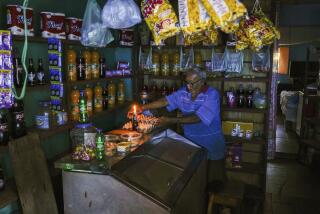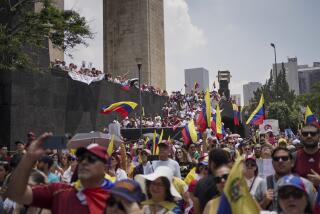Venezuelan Merchants Feeling Pain of Strike
EL HATILLO, Venezuela — Christmas is supposed to be the best time of year here.
Tourists from all over flock to this small colonial town just outside the capital, Caracas, using Christmas bonuses to snap up handicrafts and folk art at dozens of small stores crowded along narrow streets.
The hundreds of thousands of dollars that pour into the local economy spread across the nation. They reach into the Amazon in the east, where entire tribes depend on sales of handicrafts here for hard cash. And they reach to the Andes in the west, where small farmers grow specialty coffee for sale to local merchants.
But this year, it’s different. Venezuela’s nationwide strike, now in its second week, has made the business of Christmas a mere memory.
“This has totally paralyzed us,” said Gloria Mugarra, who was sitting Monday in her small furniture shop, empty except for the smell of wood stain and handmade chairs and tables. “We are suffering considerably.”
Designed to force President Hugo Chavez to accept early elections, the protest has affected every sector of this nation’s economy, from the wealthy owners of department stores to poor vendors who sell candy on street corners.
Economists believe that the country lost at least $600 million in exports last week, much of that as a result of a near-shutdown in oil production. Analysts are predicting that even if the strike ends this week, it will have shaved an entire percentage point off the country’s estimated $80-billion GDP for 2002, which has already contracted by 7%.
On Monday, the strike spread. Bankers joined in. So too did some employees from the country’s tax collection agency. More oil managers and union workers signed up.
The protest seemed to be reaching a crucial phase. Gasoline was running out, with long lines of cars backed up at service stations throughout the country. Diesel fuel supplies were thought to be even lower, with some analysts predicting that the country’s system for transporting commercial goods, composed entirely of diesel-fueled tractor-trailers, would grind to a halt today or Wednesday.
Ali Rodriguez, the president of the state oil company, Petroleos de Venezuela, or PDVSA, took to the airwaves to warn that the country was rapidly running out of money.
He said a continued strike would mean the state couldn’t pay the salaries of state workers -- about 1.3 million people -- or make payments to state contractors.
“What’s threatening us is a true national disaster,” he said.
There was panic buying in local markets. One grocery store executive said business in December has been double the norm, even though many stores have been open only half-days to show support for the strike.
“We’re not going to sell anything next month. People are stocking up,” said the executive, Eduardo La Cruz, who was waiting to buy gas at a filling station.
Chavez’s opponents -- from businesses to unions to ordinary people -- want him to resign and hold new elections. But Chavez insists that nothing can be done until August, when the constitution would permit a referendum on his rule.
Amid growing pressure on both sides to reach an accord soon, talks resumed Monday night, but it was unclear whether any progress was made.
Chavez has hardened his position, declaring a “battle” for control of the state oil company. He sent national guard troops to take over private fuel shipping companies Monday and posted soldiers around gas stations.
And strike organizers have gained momentum with the support of the country’s oil sector and outrage over the deaths of three protesters, blamed on Chavez and his supporters.
On Monday, for the first time, the organizers said the protest would continue until Chavez leaves office. Previously, they have pinned the lifting of the strike on an agreement for a February referendum.
“We are in the final hours of an authoritarian regime,” said Carlos Ortega, leader of the country’s largest union, the Confederation of Venezuelan Workers. “We will be in the streets until he leaves. Mr. Chavez, know that the people that you have ignored and not listened to will remove you from power in a peaceful, democratic and constitutional way.”
What was clear Monday was how much the strike has hurt businesses big and small.
The country’s largest source of export income, the state oil company, had stopped all exports, resulting in an estimated daily loss of about $75 million.
Internal gas supplies were also hurting. Adrian Bendeck, Chevron Texaco’s Venezuela distribution manager, said that between 15% and 20% of the chain’s 83 service stations were completely out of fuel.
The shortages of fuel and transport ran down the chain of industry, paralyzing ports and major production centers of iron and aluminum in the southeast, where tugboat pilots had stopped moving barges along the mighty Orinoco River. Those industries account for about $10 million in revenue a day.
“Those plants are going to stop any minute,” said Alberto Quiros, a political and economic analyst. “There are ... a lot of people working there.”
As more and more businesses feel the strike, especially small ones, Chavez is likely to come under pressure from his own supporters to find a solution.
For most of the strike’s duration, it’s been business as usual for the hordes of vendors who participate in the country’s informal economy, the folks who sell pirated CDs and Britney Spears notebooks from tiny stalls that crowd the streets in urban centers.
But as buses stop running and delivery trucks fail to bring new supplies, as milk and food run short, the poor -- who make up 80% of Venezuela’s population and most of Chavez’s support -- will start to feel the pinch.
“He has to allow elections. He has no other way out,” said Fernando Martinez, a former transport minister who is now in the private sector.
Here in El Hatillo, in cool green mountains a 20-minute drive outside Caracas, the effects of the strike were clear enough.
The place was a ghost town. The tiny central square looked like the inner courtyard of a prison, ringed with restaurants and shops that had pulled down metal shutters.
Just up from the square, Javier Martin had locked the wooden doors of Hannsi, which boasts of being Venezuela’s largest handicraft and arts center.
When he opened them for a few moments to speak to journalists, two people passed by and asked whether he was open.
“No,” he said with a sad smile. “Not until the strike’s over.”
Inside the 32,000-square-foot showroom, Venezuela’s remarkably rich folk art was on display.
Martin, the manager of the center, said he would sell $60,000 worth of folk art in a normal week in December. Last week, he sold nothing, and he still paid the salaries of his 40 employees.
He said his business could survive perhaps two more weeks of the strike.
“We’re going to make the maximum sacrifice we can,” he said. “After that, we collapse.”
Mugarra, the furniture store owner, said that she has lost about $15,000 in sales but that the sacrifice was worth it.
“It’s a high cost, but it’s what we have to do,” she said. “Otherwise, we’ll never get rid” of Chavez.
Economists said the willingness of small-business owners to make such sacrifices is an indicator of how deep resentment against Chavez runs.
“You don’t get businesses at Christmastime willing to forgo sales for ideological reasons,” said Ricardo Hausmann, an economist at Harvard and a former Venezuelan planning minister. “They just don’t see the viability of this regime.”
More to Read
Sign up for Essential California
The most important California stories and recommendations in your inbox every morning.
You may occasionally receive promotional content from the Los Angeles Times.










